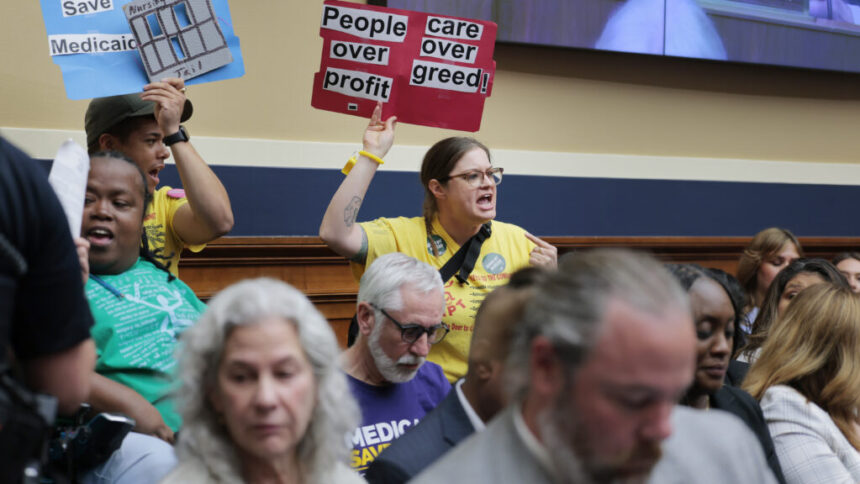Latoya Maddox, a disability rights activist, found herself at the center of a heated protest at a recent meeting of the House Energy and Commerce Committee. As lawmakers debated the future of Medicaid, a vital health care program for millions of Americans, Maddox and her fellow disabled activists raised their voices in opposition to proposed cuts. The passionate chanting of “No cuts to Medicaid!” quickly drew the attention of Capitol Police, who escorted them out of the room.
This protest was just one of many organized by American Disabled for Attendant Programs Today (ADAPT), a group dedicated to advocating for the rights and needs of the disability community. Since its inception in the 1980s, ADAPT has been at the forefront of major actions, including the historic “Capitol Crawl,” which played a pivotal role in the passing of the Americans with Disabilities Act.
Despite their efforts, Maddox and other activists are facing an uphill battle to protect Medicaid-funded services. Vice President JD Vance recently broke a tie in the Senate, allowing Republicans to pass a $4.5 trillion tax-cut bill that includes significant cuts to Medicaid. These cuts could jeopardize essential services for nearly 12 million people, including Maddox, who relies on Medicaid for round-the-clock care due to her disabilities.
The proposed cuts have sparked outrage among disability advocacy groups like ADAPT, who have organized protests and “die-ins” in Capitol buildings to raise awareness about the devastating impact of slashing Medicaid funding. Maddox, who has multiple disabilities and requires constant care from aides, expressed deep concerns about the potential consequences of these cuts on her ability to access essential medical services and support.
As a seasoned activist, Maddox is no stranger to putting her body on the line for the causes she believes in. She has been involved in numerous protests over the years, including a demonstration outside Sen. Lindsey Graham’s office in 2017 to oppose cuts to Medicaid and other health care services. Despite facing challenges and physical risks, Maddox remains committed to fighting for the rights of the disability community.
In a candid interview, Maddox shared her personal journey to activism and the impact of Medicaid on her life as a disabled mother. She reflected on the pivotal moment that inspired her to join the fight for disability rights and the challenges she has faced along the way. Despite the uncertainty of what the future holds for Medicaid, Maddox remains determined to stand up for herself and others in the face of adversity.
Living with a disability is a challenge that many people do not fully understand. As someone who has dedicated their life to helping others with disabilities navigate the healthcare system, I know firsthand the struggles that come with trying to access necessary services and support. But there are people out there who wouldn’t be able to walk a day in my shoes.
For me, the stakes are even higher because I also have a son who relies on daily medications to function in school. I can’t imagine the fear of not being able to afford his medications and risking him getting kicked out of school for something that is out of his control. The importance of Medicaid for families like mine cannot be overstated.
Recently, I was arrested by Capitol security for protesting at the House Energy and Commerce Committee hearing. Despite the Senate passing their version of the tax bill, our activism is far from over. We need to shift the narrative to our governors and ensure that disabled adults and seniors are not left behind in state legislation.
As a grassroots nonprofit, we face financial challenges in organizing protests and advocacy efforts. Balancing my activism with caring for my son is a constant struggle, as I worry about the impact of potential arrests on my family and daily life.
The threat of Medicaid cuts looms large, with the possibility of disabled individuals being forced into nursing homes or institutions. Organizations like ADAPT are fighting against this future, advocating for the right to live in the community and have the choice to reside in a facility if desired.
Living in a community provides a sense of independence and freedom that cannot be replicated in an institution. People with disabilities deserve the same opportunities as anyone else, including the ability to host parties, have family gatherings, and go on vacations without restrictions.
As we continue to fight for our rights and advocate for the preservation of Medicaid, we must remember that the future of disabled individuals hangs in the balance. We will not stop until everyone has the opportunity to live their lives to the fullest, free from unnecessary restrictions and limitations.
Title: The Impact of Missing Persons on Mental Health Services
In today’s society, the issue of missing persons is a serious concern, especially when it comes to individuals who rely on mental health services. When someone goes missing for two days and fails to make contact, they are often labeled as AWOL, and their beds in mental health facilities may be given away. This can have a devastating impact on their well-being and mental health.
The consequences of going missing without proper communication can be dire for individuals who are in need of medications and services to manage their mental health conditions. Without access to the right medications and services, there is a risk that they may harm themselves or put themselves in dangerous situations while trying to cope without the necessary support.
The implications of this issue are significant and should not be underestimated. It is crucial for mental health facilities and services to have protocols in place to ensure the safety and well-being of individuals who may go missing. This includes maintaining regular communication with patients, monitoring their well-being closely, and having procedures in place to locate them quickly if they do go missing.
The impact of missing persons on mental health services cannot be ignored. It is essential for facilities to prioritize the safety and care of their patients, ensuring that they have access to the medications and services they need to manage their conditions effectively. By addressing this issue proactively, we can help prevent potential harm and ensure that those in need receive the support and care they require.
In conclusion, the issue of missing persons in mental health services is a serious concern that requires attention and action. By recognizing the potential consequences of individuals going missing without proper communication, we can work towards ensuring the safety and well-being of those in need of mental health support. It is essential for facilities to have protocols in place to address this issue effectively and prevent any harm that may result from individuals going missing without the necessary care and support.








